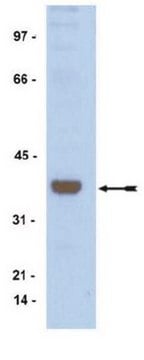21-170
TOPflash (TCF Reporter Plasmid)
Transfection grade T-cell factor reporter plasmid containing 2 sets (with the second set in the reverse orientation) of 3 copies of the TCF binding site (wild type) upstream of the Thymidine Kinase minimal promoter and Luciferase open reading frame.
Synonym(s):
TCF Reporter Plasmid
Sign Into View Organizational & Contract Pricing
All Photos(1)
About This Item
UNSPSC Code:
41106617
eCl@ss:
34360190
NACRES:
NA.41
Recommended Products
Quality Level
manufacturer/tradename
Upstate®
technique(s)
transfection: suitable
NCBI accession no.
shipped in
dry ice
General description
TOPflash is a β-catenin-responsive firefly luciferase reporter plasmid.
Application
TOPflash (TCF Reporter Plasmid) has been used for transfection of cultured cells in TOP flash reporter gene assay.
Legal Information
UPSTATE is a registered trademark of Merck KGaA, Darmstadt, Germany
Disclaimer
Unless otherwise stated in our catalog or other company documentation accompanying the product(s), our products are intended for research use only and are not to be used for any other purpose, which includes but is not limited to, unauthorized commercial uses, in vitro diagnostic uses, ex vivo or in vivo therapeutic uses or any type of consumption or application to humans or animals.
Storage Class Code
12 - Non Combustible Liquids
WGK
WGK 2
Flash Point(F)
Not applicable
Flash Point(C)
Not applicable
Certificates of Analysis (COA)
Search for Certificates of Analysis (COA) by entering the products Lot/Batch Number. Lot and Batch Numbers can be found on a product’s label following the words ‘Lot’ or ‘Batch’.
Already Own This Product?
Find documentation for the products that you have recently purchased in the Document Library.
Species differences in kidney necrosis and DNA damage, distribution and glutathione-dependent metabolism of 1,2-dibromo-3-chloropropane (DBCP).
E J S?derlund,M L?g,J A Holme,G Brunborg,J G Omichinski,J E Dahl,S D Nelson,E Dybing
Pharmacology & Toxicology null
Jia-Hao Xiao et al.
The Journal of biological chemistry, 278(32), 29954-29962 (2003-05-29)
Beta-catenin is a component of stable cell adherent complexes whereas its free form functions as a transcription factor that regulate genes involved in oncogenesis and metastasis. Free beta-catenin is eliminated by two adenomatous polyposis coli (APC)-dependent proteasomal degradation pathways regulated
Haijun Zhao et al.
Oncology letters, 21(6), 472-472 (2021-04-29)
Long non-coding (lnc) RNAs have emerged as important regulators of cancer development and progression. Several lncRNAs have been reported to be associated with prostate cancer (PCa); however, the involvement of lncRNA SNHG17 in PCa remains unclear. In the present study
Ji Young Choi et al.
Journal of bone and mineral research : the official journal of the American Society for Bone and Mineral Research, 33(11), 2059-2070 (2018-07-13)
Patients with Hutchinson-Gilford progeria syndrome (HGPS) have low bone mass and an atypical skeletal geometry that manifests in a high risk of fractures. Using both in vitro and in vivo models of HGPS, we demonstrate that defects in the canonical
Sergio Roman-Roman et al.
The Journal of biological chemistry, 279(7), 5725-5733 (2003-11-25)
Activation of the Wnt signaling cascade provides key signals during development and in disease. Wnt signals are transduced by seven-transmembrane Frizzleds (Fzs) and the single transmembrane low density lipoprotein receptor-related proteins 5 or 6. In the course of the analysis
Our team of scientists has experience in all areas of research including Life Science, Material Science, Chemical Synthesis, Chromatography, Analytical and many others.
Contact Technical Service







